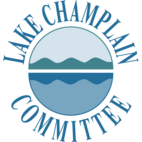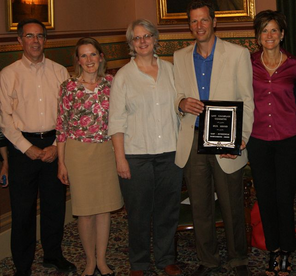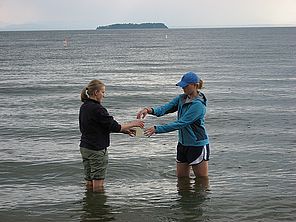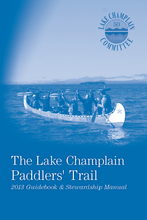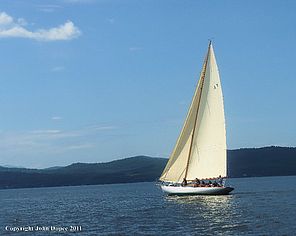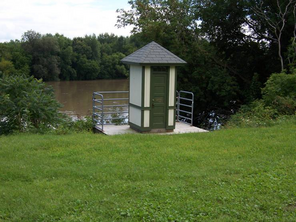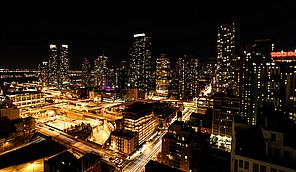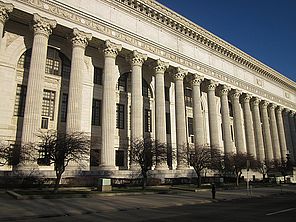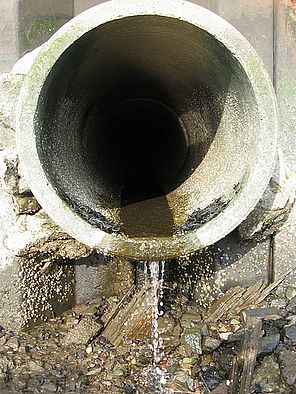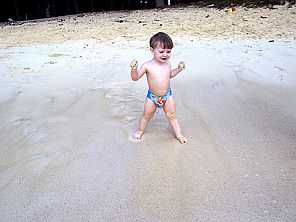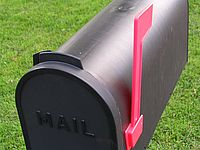LCC Summer Lake Ripples - Awards, 200 Trained, 50th Party, Lake Race, Gages Hostage, Leg. Wraps and More!
LCC Honored with GMP-Meeri Zetterstrom Award
We were delighted to receive the 2013 Green Mountain Power (GMP) Meeri Zetterstrom award at a May ceremony at the Vermont State House. “The Lake Champlain Committee has been an active, constructive force for the betterment of Lake Champlain and the entire Champlain Valley for half a century,” GMP President and CEO Mary Powell said in delivering the award. “Like Meeri Zetterstrom, for whom the award is named, LCC has demonstrated a long-term commitment to building alliances to solve environmental problems, while pursuing education and environmental research. LCC’s determination and leadership, despite tremendous environmental challenges and obstacles, mirrors on a broad scale Meeri Zetterstrom’s leadership and commitment to saving ospreys at Lake Arrowhead." Read more on the award history and 2013 ceremony.
Over 200 Trained to Assess Water - Next Training is July 9
LCC's blue-green algae monitoring program got underway several weeks ago. Staff Scientist Mike Winslow has trained over 200 people to assess conditions, differentiate blue-green algae from other lake phenomena, and categorize water quality.
"We are excited to be working with such a dedicated group of lake-lovers to better inform the public about the presence and absence of algae blooms on the lake," said Winslow.
LCC blue-green algae monitors provide weekly observations about water quality from designated locations around the lake from mid-June through Labor Day. To become a monitor you need to attend an LCC training session, have weekly access to the same shoreline location and the ability to submit online reports. The program provides critical data on where and when blooms are happening and is relied on by municipalities, park managers, and public health and environmental agencies to assess whether the water is safe for recreation. It also adds to our knowledge about the triggers for blooms so we can reduce their frequency.
We will host another training session at the LCC office at 208 Flynn Avenue on Tuesday, July 9 at 2:00 PM. The training will last about an hour. An <link get-involved events blue-green-algae-monitoring-training-session-rsvp _blank internal-link internal link in current>advance RSVP is helpful to ensure we have enough room.
LCC's 50th Anniversary Meeting - 9/14/13 at Flat Rock Camp!
Don't forget to mark your calendar and plan to join us for our 50th anniversary celebration at Flat Rock Camp in Willsboro, New York. We'll have great food, camaraderie as we reflect on the past and look forward. Many thanks to our hosts the Paine Family and event sponsor Champlain National Bank. Further details will follow but please set aside the date for this special lake gathering.
Get Your Guidebook and Travel the Trail!
The 2013 edition of the Paddlers' Trail guidebook is out! It’s jam-packed with important information for great adventures on the water including site descriptions and chartlets for 41 Trail locations (with access to over 600 campsites), launch site listings, natural history articles, safety and stewardship tips, equipment check lists and more! The guidebook isn't sold, it's only available through a yearly LCC membership of $45 or more. Annual memberships support LCC's Trail development and the work for a healthy, accessible lake. <link support join _blank external-link-new-window external link in new>Join or <link support renew _blank external-link-new-window external link in new>renew online to ensure you have the guidebook in hand for the rest of this paddling season.
Race for the Lake on July 20
Get out on the water and support great lake-related causes - including the Lake Champlain Committee - by participating in the 2013 Regatta for Lake Champlain! This ye ar’s event, the tenth annual, will take place on Burlington’s Waterfront July 19 and 20. The Regatta for Lake Champlain is not your ordinary day out on the Lake; it's a family-friendly benefit sailboat race to promote the health, well-being, sustainable use and stewardship of Lake Champlain.
ar’s event, the tenth annual, will take place on Burlington’s Waterfront July 19 and 20. The Regatta for Lake Champlain is not your ordinary day out on the Lake; it's a family-friendly benefit sailboat race to promote the health, well-being, sustainable use and stewardship of Lake Champlain.
The Regatta will start just outside Burlington Harbor on Saturday, July 20 at 11:30 AM. This pursuit format race features a handicapped start so sailors and crews of all levels, from cruising to competitive racers, can participate. Registration starts at $150 and is available online at RegattaForLakeChamplain.org. Anyone with a sailboat no matter how old or new can put together a crew. There are a limited number of spaces so we encourage folks to sign-up quickly. Read more about Regatta for Lake Champlain.
Stream Gage Funding Held Hostage - Your Help Needed
The USGS is once again threatening to stop operating stream gages in the Champlain Basin. The notice on their website reads, “The U.S.Geological Survey (USGS) will discontinue operation of up to 375 streamgages nationwide due to budget cuts as a result of sequestration. Additional streamgages may be affected if partners reduce their funding to support USGS streamgages. The USGS is working to identify which streamgages will be impacted and will post this information as it becomes available. Streamgages are used nationwide to predict and address drought and flood conditions by monitoring water availability. The USGS and over 850 Federal, State, and local agencies cooperatively fund the USGS streamgaging network, which consists of over 8,000 streamgages. When budget fluctuations occur, the network is impacted.”
There are 16 gages in the Champlain watershed listed by the USGS as "threatened and endangered", ten in Vermont and six in New York. “The gages are vital to our flood forecasting and warning system and to track the effectiveness of our nutrient reduction investments and assess lake health” notes LCC Executive Director Lori Fisher. In the long term, failure to maintain these extensive data sets will impair our ability to detect water quality trends. In the short term, loss of the gages will weaken our ability to predict floods. Stream gages provide a fundamental early warning system. With climate change leading to increased frequency of intense storms, flood forecasting becomes even more important. Read more about stream gages.
Foot Dragging on Champlain Canal Barrier
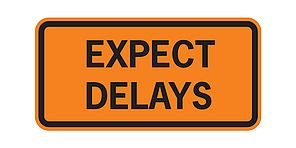
The Army Corps is notoriously slow in developing and implementing projects. The Champlain Canal is a disappointing example of their glacial pace. It’s been almost a year since the invasive spiny water flea was found in the Canal. It has taken that long for the Army Corps and the New York State Canal Corps to figure out what they need to study before they can erect any barriers to spreading the species to Lake Champlain. Reports are that it could take another six months before the actual studies begin, despite the availability of $200,000 through the Lake Champlain Basin Program to conduct the work. There is no telling how long it might take to get around to building a barrier. A compounding factor has been the redirection of Army Corps staff to deal with recovery from Hurricane Sandy, but the reaction to an invasive species in the Canal has been anything but rapid. Tell your Senators and Representative to let the Army Corps know the delays are unacceptable and they should move quickly to prevent the spread of invasive species to Lake Champlain.
Underwater Power Line Gains Approval
The New York State Public Service Commission has approved construction of a high voltage direct current transmission line to deliver electricity from generating sources in Quebec to the New York City area. The original application was filed over three years ago and negotiations towards approval spanned almost 16 months.
Once built, the power line would have a length of approximately 335 miles from the generating source in Quebec to its southern terminal in New York City. The cable would be buried at varying depths up to 3 feet under Lake Champlain and the Hudson, Harlem, and East Rivers. The cables would cross the border under Lake Champlain and run southward to the Town of Dresden north of the Village of Whitehall. On its way to the Hudson, the cables would be routed briefly along State Route 22 and then parallel rail lines until entering the Hudson River in the Town of Catskill. Read more about the underwater power line.
Vermont Legislative Wrap
The 2013 legislative session saw little progress on water quality despite starting out with a report from the Agency of Natural Resources about the substantial problems facing the state’s waterways and high price tag for addressing all the issues. The one substantive bill that resulted from the Agency report would have increased protections for all Vermont lakeshores. That bill passed the Vermont House but was not able to make its way through the Senate. Instead, the Senate appointed a summer study commission. The commission, composed of both House and Senate members, will assess the state of Vermont shorelines, compare Vermont shoreline regulations with other states, and receive input from citizens. Read more on the 2013 Vermont legislative session.
New York Legislative Wrap
The New York State Assembly passed a bill that would extend by two years a moratorium on fracking in the state. However, the Senate continues to stall consideration of that bill and another that would end an industry exemption that stripped the designation ‘hazardous’ from fracking waste. Indications are that a majority of Senators would support the limitations, but Senate leaders are blockading a vote. The moratorium bill would require a health study to be completed before a final decision is regarding the future of fracking in the state. The Cuomo Administration continues to deliberate about whether or not to end the current moratorium, but there is no indication when a decision might be forthcoming.
Sewage Pollution Right to Know
The New York State Department of Environmental Conservation (NYS DEC) will begin collecting discharge reports of untreated and partially treated sewage from public wastewater systems. The new law requires notification of any discharges from publically owned waste water treatment works or sewer systems within two hours of discovery of the discharge. The new law went into effect in May of this year after passing the legislature in August of 2012. A second part of the law will require direct public notification of discharges. NYS DEC anticipates draft regulations regarding this requirement for the fall.Under the previous law, notice had to be provided to DEC within two hours only if the discharge was near a public drinking water in-take, a bathing beach, or a shellfish bed, while other discharges needed to be reported within 24 hours. An Excel spreadsheet of discharges over the past month for the entire state is available on the DEC website.
Nature Note – Pollen
A yellow scum often appears along the shores of Lake Champlain from late spring through early summer. Though the scum has the texture and consistency of an algae bloom it is actually pollen. While the pollen may be unsightly, its presence means there are many pine trees in the vicinity of the lake, and thus indicates a degree of health in the watershed.
The pollen on the lake’s surface represents wasted effort on the part of the pine trees. Pollen is the means by which plants convey genetic material from a male plant or part of a plant to a female. Pine trees are monoecious, which means the male and female parts can be found on the same tree. To avoid self-fertilization, male cones develop on a given tree one to two weeks before the female cones. The pine pollen is then wind dispersed, which is not a very efficient means of getting from plant to plant. Whatever ends up in the lake did not make it to a female tree. Read more about pollen.
Lake Look - Norovirus
Last July the manager of Sand Bar State Park in Milton, Vermont received a call that would greatly affect his summer. Someone whose family had visited on July 1, 2012 reported that two children who had been swimming later became ill. That alone wasn’t a big deal; kids get sick all the time from any number of causes. When a second report came in a few days later, this time four children from one family all of whom had also been swimming on July 1st, it became much more worrisome. By the afternoon of July 6th the media began calling and the park had itself a crisis. Reports of illness continued to accumulate over the next 17 days and the Department of Health got involved. The park closed on July 17th and would remain closed for three days while health officials searched for the culprit. What they found provides an interesting glimpse about both real and perceived risks of swimming in public areas. Read more about norovirus.
Moving? Changing Email Addresses?
If you’ve changed your address recently, please send us an email so we can update your files and ensure you receive news on lake issues and LCC’s work. Email is our primary form of communication with members. Mailing electronically saves time and resources and reinforces the stewardship ethic of our mission. We don’t give away or sell email addresses.
To ensure you receive email from LCC, please add lcc@lakechamplaincommittee.org and the domain enews.lakechamplaincommittee.org to your safe/allowed list and address book. Thanks!
Like LCC on Facebook!
Follow LCC on Facebook for beautiful lake photos, informative updates, lake conversations and more!
Lake Champlain Committee Board of Directors
Gary Kjelleren - Chair (South Hero, VT), Sharon Murray - Treasurer (Bolton, VT), Alan Booth (Plattsburgh, NY), Sandy Montgomery (Montreal, QC), Ann Ruzow Holland (Willsboro, NY), Mary Van Vleck (Charlotte, VT), Chuck Woessner (Grand Isle, VT).
Lake Champlain Advisory Council
Megan Epler Wood (Burlington, VT), Steven Kellogg (Essex, NY), Peter S. Paine, Jr. (Willsboro, NY), Mary Watzin (NC).
Lake Champlain Committee Staff
Lori Fisher, Executive Director
Jessica Rossi, Office Manager
Mike Winslow, Staff Scientist
